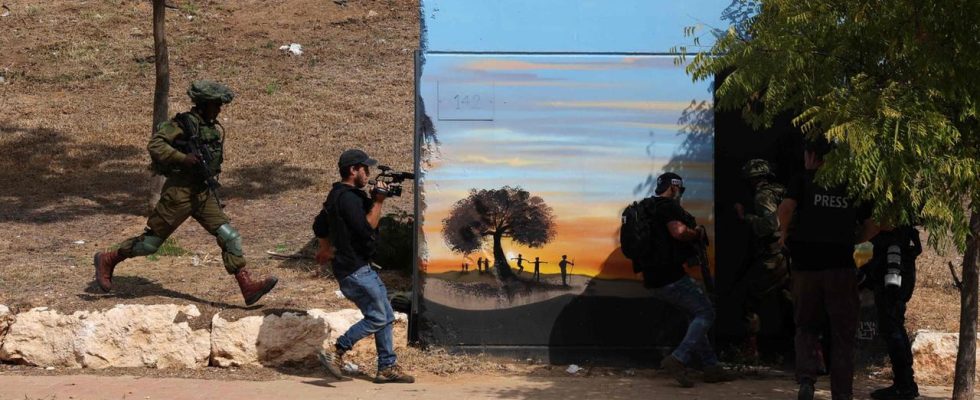interview
Israel’s accusations against journalists that they knew about the Hamas attack in advance are questionable, says ARD correspondent Jan-Christoph Kitzler. Journalists would not become accomplices if they documented crimes. Rather, they are obliged to do so.
tagesschau.de: Israel accuses reporters and news agencies of having known in advance about Hamas’s plans to attack Israel on October 7th. What evidence is there so far for this?
Jan Christoph Kitzler: No. The accusation is based on the fact that reporters were at the scene early. Reuters has stated that the photographer working for the agency took an image that is now being criticized, among other things, 45 minutes after the attack began. This information can be checked via the metadata of a photo. If the colleague hadn’t been there quickly, he wouldn’t have done his job properly. It is extremely questionable to conclude that journalists knew about the Hamas terrorist attack in advance.
About Jan-Christoph Kitzler
Jan-Christoph Kitzler did a traineeship at NDR and worked on television for several years. He has been with Bayerischer Rundfunk since 2013 – and worked as a correspondent in the ARD radio studio in Rome. He has been a correspondent in Tel Aviv since November 2022.
tagesschau.de: Another accusation is that some reporters became accomplices by documenting the terrible acts. How is this proven?
Clitoris: To my knowledge, there is no evidence that reporters took part in the crimes. However, it is proven that they documented them. Journalists do not become accomplices when they document terrible crimes, on the contrary: they are obliged to do so. This accusation reveals a skewed understanding of the work of journalists.
tagesschau.de: The allegations come from, among others, the NGO “Honest Reporting” – what do we know about them?
Clitoris: ““Honest Reporting” says about itself that it examines reporting about Israel for inaccuracies and partiality and uncovers them. The organization acts very aggressively and repeatedly denounces large media companies. The aim is to investigate reporting about Israel and… to influence the Middle East in a certain pro-Israel direction on the basis of “real facts.” The organization is also very aggressive in raising donations, which are likely to be the most important source of income.
When is the limit crossed?
tagesschau.de: The allegations are directed against, among others, four photographers, one of whom took a photo of himself in front of a burning Israeli tank. Isn’t that crossing the border?
Clitoris: Did we also ask this question in the war against Ukraine, for example? A video in front of a burning tank is not a border crossing. It documents that a reporter is on site.
But I did see a border crossing, namely a photo that shows one of the reporters next to Yayha Sinwar, one of the heads of the terrorist organization Hamas. Sinwar puts his arm around his shoulder and gives him a kiss on the cheek. This form of closeness should not exist for a journalist, especially when it comes to one of the most wanted terrorists at the moment. CNN, among others, also announced that they had parted ways with the freelancer.
tagesschau.de: The news agencies point out that the colleagues who reported on the terrorist attacks were freelancers rather than self-employed journalists, known in industry jargon as “freelancers”. What does this mean in editorial collaboration?
Clitoris: The dependency between the reporter and the news agency is less close than with permanent colleagues. As a rule, freelancers have not just one, but several clients. Nevertheless, a news agency must also check the material that they receive from freelancers. And as far as I know, this is done very conscientiously.
“Journalists are becoming targets”
tagesschau.de: The head of the Israeli press office calls the reference to the independent work of the criticized journalists an “excuse.” Is that a valid accusation?
Clitoris: As I understand it, that doesn’t make any difference. But it is very dangerous for all journalists working in this war. Benny Gantz, a minister in Israel’s war cabinet, said: “If there were journalists who knew about the massacre, photographed it and stood idly by as children were slaughtered, they are no different from terrorists and should be treated as such .”
The accusation that journalists knew about Hamas’ terrorist attack in advance is unsubstantiated. But statements like these make journalists a target. This can be understood as an open call for violence against journalists. More than 30 reporters have already died in this war in the Gaza Strip.
tagesschau.de: You were in the Gaza Strip yourself as a reporter. What does it mean for journalists that the region is controlled by Hamas and that it is responsible for its administration?
Clitoris: Anyone who enters an area that is controlled by a dictatorship or a terrorist regime submits to a certain extent to the rules of the game there, right from the moment they enter the country, regardless of whether they are a journalist or not. When I entered the Gaza Strip, the terrorist organization Hamas knew who I was traveling with, what topics I wanted to report on and where I was staying.
This has nothing to do with the freedom of the press, which exists in a democracy like Israel, for example. Nevertheless, there was no alternative for me not to report from the Gaza Strip. More than 2.3 million people live there, and many of them suffer under Hamas and are critical of the regime. The aim of my reporting from there was to convey a picture of the lives of the people in the Gaza Strip and of the special, very difficult conditions there. The whole thing is also very critical.
The interview was conducted by Eckart Aretz, tagesschau.de

